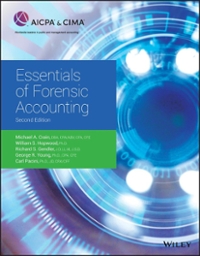Question
Unit 1 Discussion 2 The AICPA Code of Professional Conduct Ethical behavior is the foundation for all modern civilizations. Organized society depends on its members
Unit 1 Discussion 2
The AICPA Code of Professional Conduct
Ethical behavior is the foundation for all modern civilizations. Organized society depends on its members behaving morally and thus supporting the framework of the social structure. As such, ethical conduct is the foundation of many professional occupations, such as police officers, lawyers, doctors and accountants. The public relies on these professionals to act on behalf of the client or patient, and to place their interests above the professionals own.
An essential component in establishing the standards of this expected behavior is a formal written code of conduct. For the auditing profession, this formal code is known as the AICPA Code of Professional Conduct. The framework for the code is provided by the following six fundamental ethical principles: (AICPA, 2013)
- Responsibilities: In carrying out their responsibilities as professionals, members should exercise sensitive professional and moral judgments in all their activities.
- The Public Interest: Members should accept the obligation to act in a way that will serve the public interest, honor the public trust, and demonstrate commitment to professionalism.
- Integrity: To maintain and broaden public confidence, members should perform all professional responsibilities with the highest sense of integrity.
- Objectivity and Independence: A member should maintain objectivity and be free of conflicts of interest in discharging professional responsibilities. A member in public practice should be independent in fact and appearance when providing auditing and other attestation services.
- Due Care: A member should observe the profession's technical and ethical standards, strive continually to improve competence and the quality of services, and discharge professional responsibility to the best of the member's ability.
- Scope and Nature of Services: A member in public practice should observe the Principles of the Code of Professional Conduct in determining the scope and nature of services to be provided.
Instructions:
- Visit the AICPA website www.aicpa.org. Select Research>Standards>Professional Code of Conduct from the menus. Once you have reached the Professional Code of Conduct page, Select >Section 100 Independence, Integrity and Objectivity, then Select>Section 100-1 Conceptual Framework for AICPA Independence Standards. Read through the specific expectations.
- Next read through each of the scenarios below. Each of the situations involves a possible violation of the AICPAs Code of Professional Conduct. Choose one of the scenarios and indicate whether it violates the Code with regard to Independence. Explain your reasoning and be sure to cite the specific section of the code that supports your opinion.
- Jessica Rabbit, CPA, has given business advice to her audit client, Cotton Inc., a privately held company. She has analyzed the financial statements, and advised expansion plans. She has not participated in any management decisions.
- Mustang Auto Parts, Ltd., a privately held company has asked their accountant, James Dean, CPA, to advise and help implement a new internal control system. Mustang would like Dean to organize the hiring and training of the new employees. Mustang will make the final hiring decisions based upon Deans recommendations. Once the system is in place, Mustang will supervise the employees.
- Monkey See- Monkey Do, a large manufacturer of childrens clothing, chose Johnson & Johnson to do next years audit. Kevin Johnson, one of the firms partners, owns 500 shares of Monkey stock. When the firm was investigating the possibility of bidding for the Monkey audit contract, Mr. Johnson placed his shares of stock into a trust.
- Smith and Associates audits a neighborhood association in which the parents of an associate of the firm own a rental property. The home is material to the parents net worth, and the associate participates in the audit engagement.
- Kim Chou, a sole practitioner, audited San Francisco Bread Co.s, financial statements for the year ended March 30, and was issued stock by the client as payment of the audit fee. Chou sold the stock before commencing fieldwork planning for the audit of the next years financial statements.
- Dippin Donuts requires an audit for the current year. However, Dippin has not paid Jessica Rabbit, CPA the fees due for tax services performed two years ago. Dippin issued Rabbit a note for the unpaid fees, and she proceeds with the audit.
Respond to at least two classmates whose responses differ from your own. Discuss why you agree or disagree with their responses. Is there anything you can add or take away from their responses? You must respond to questions and comments that your classmates make to your own information posted.
Your discussion postings will be graded on content, clarity, understanding, and depth as well as on your level of participation. It is important to stay current in discussion threads. You must be an active, regular participant. Please make sure that your replies are "value-added." Please refer to the Discussion Forum Participation page, located under the Online Policies and Procedures block on the main page of your course, for more information on how you are graded in the online forums.
References
AICPA. (2013) Code of Professional Conduct. www.aicpa.org
Step by Step Solution
There are 3 Steps involved in it
Step: 1

Get Instant Access to Expert-Tailored Solutions
See step-by-step solutions with expert insights and AI powered tools for academic success
Step: 2

Step: 3

Ace Your Homework with AI
Get the answers you need in no time with our AI-driven, step-by-step assistance
Get Started


